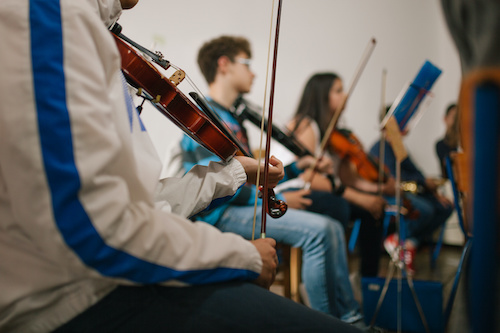Key points:
- Music education offers benefits far beyond musical ability, including leadership experience
- See article: 10 online music education tools
- See article: How a former music teacher approaches leadership and learning
- For more on music education, visit eSN’s Innovative Teaching page
At its core, music is about self-expression and creativity. Music education also gives students a chance to reflect on their inner thoughts and helps struggling children build their confidence in a safe space.
When used correctly, music can even uplift entire communities and help folks overcome hardships. Inspirational scores make a real difference to individuals who are down on their luck and lonely students can bond around a shared love of music.
A robust musical education goes beyond the walls of the classroom, too. Musical programs can partner with community groups to bring joy and fulfillment to folks who live in the area. These types of programs can help students gain experience as volunteers and foster a sense of social responsibility in schoolchildren.
The value of musical education
Today, only 10.1 percent of young adults can play a musical instrument. This exposes a major flaw in our current education system. Being able to play an instrument increases the brain’s neuroplasticity, reduces stress, and improves memory and coordination. Folks who participate in musical education benefit from improved listening and reading skills, too.
This sentiment is echoed by Nina Kraus, professor of communication sciences, neurobiology and physiology at Northwestern University. Kraus explains that playing music offers “an unlimited capacity for improvement,” as great musicians know that they can always strive for “greater nuance, defter technique, and better synchrony with their ensemble.”
This kind of robust practice triggers broader cognitive and sensory changes within students. Folks who have a musical education are able to process subtle acoustic differences. This gives students a head start when trying to learn a new language.
But the benefits don’t stop there. Kraus continues to explain that musical education has intangible benefits like improved focus and discipline, increased social engagement, and deeper friendships that have been formed while rehearsing with friends. These benefits can be supercharged when going beyond the classroom, as students will be exposed to a greater range of people with a host of different backgrounds and insights.
Music and leadership
Most people associate scholastic leadership with student presidents, peer mentoring, or captaining a sports club. However, music provides the perfect space for would-be student leaders to practice their ability to work with a team and guide their peers toward better performances.
This approach is championed by Crystal Hernandez, who sees the school system as synonymous with an orchestra. As a musician, Hernandez gained vital leadership skills while learning to meld with the larger symphony. This kind of experience serves her well as a principal, where she uses her musical experience to ensure that her followers are all humming along to the same tune.
Students who have the opportunity to mentor budding musicians outside of the school system gain hands-on experience with community engagement, too. This is pivotal if you want to run the kind of educational program that produces civic minded, socially responsible students.
Community opportunities
Connecting with the wider musical community is easier today than ever before. This is largely thanks to the hard work of organizations like The National Association for Music Education, which puts learners in contact with community music groups.
Working with NAME can help your school address important concerns related to musical education and community engagement. NAME addresses concerns that talented musicians are put in touch with music groups in an equitable, fair way. This doesn’t just improve the synchrony of the symphony; it ensures that students are given access to a diverse range of experiences when working with community-based musical groups.
That said, community-based musical opportunities require serious buy-in from students, educators, and community leaders alike. Increasing buy-in improves creativity by encouraging folks to take risks and push their boundaries when working together on a musical score. Sincere buy-in from all stakeholders also helps balance out the strengths and weaknesses of a musical group meaning all participants are put in a position to succeed.
Musical programs don’t have to feature large ensembles and orchestral scores, either. Community-based musical programs like Mallet Madness teach kids how to play xylophones, glockenspiels, marimbas, and metallophones while building developmental skills.
Working with the wider musical community can give students a better understanding of social responsibility, too. Students can leverage their access to online music education tools to help mentor would-be musicians and raise the overall standard of the group. This is empowering for students and community musicians alike, as both benefit from student buy-in.
Similarly, students who engage with community bands are almost certain to improve their skills. This kind of equitable exchange of experience teaches students the value of community outreach and shows young musicians that they can always find help to refine their talents.
Conclusion
A robust musical education goes beyond the classroom and teaches learners that they can use their musical skills to connect with their community. Community-based programs, like NAFME, help spread the talent in your school equitably around different music groups, too. This ensures that every student has access to a group that suits their skill level and authentically benefits from their presence.
- 4 ways to encourage play in education - April 25, 2024
- CoSN IT Leader Spotlight: Lisa Higgins - April 25, 2024
- It’s time to pay student teachers - April 25, 2024

